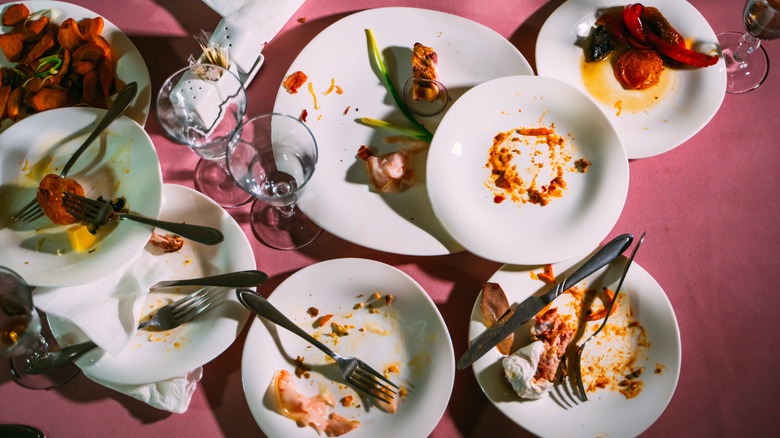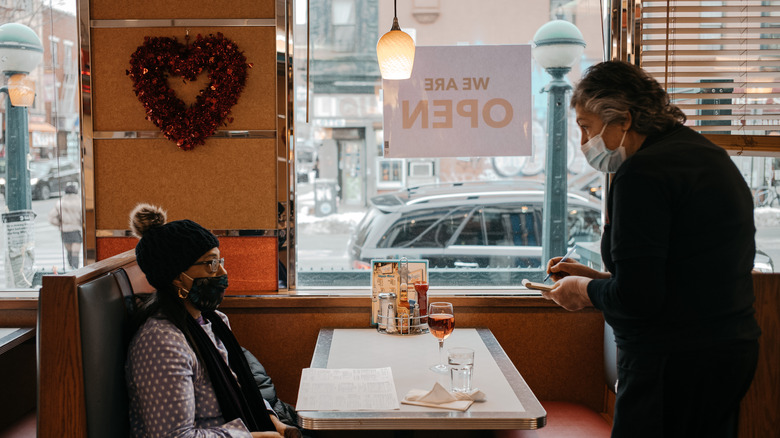Stacking Empty Plates Is A Restaurant Etiquette Mistake
Imagine this scenario: You and some pals are dining at a restaurant. Most of the group finishes their meals around the same time, but one of your slower-eating friends is still working on his food. So, you begin to stack up all the plates and silverware into one pile. Soon after, your server comes to clear the table and, upon seeing the stacked plates, quietly sighs and rolls their eyes at the dirty pile.
What's the issue here? After all, you might think that your forethought and consideration would make the job faster and easier for your server. However, that's not necessarily the case. In fact, your decision to stack the plates might actually be considered bad dining etiquette. Many experienced servers follow a specific system for clearing tables, so stacking the plates yourself at the table — especially if done haphazardly — might well mess with that system and create more work for them, or simply irritate them.
What's more, you can't attempt to anticipate your server's needs, as there's no universal plate-clearing system that applies across all restaurants. It can depend on various factors such as what's on the menu, what the table ordered, and even the type of tableware the restaurant uses.
Why stacking plates is an etiquette mistake
Firstly, when a server takes cleared plates back to the kitchen, they may need to remove scraps or napkins left on the plates, which would require them to awkwardly unstack the whole pile. Additionally, they may need to load the plates onto a dishwasher tray. If the plates have been stacked at the table, they may become smeared with leftover food on all sides, making this task messier for the server, while also requiring them to interrupt their work to wash their hands. If the plates are stacked poorly — such as in a precarious pile with silverware between every layer — it can make carrying the plates substantially more difficult.
Secondly, stacking your plates can unintentionally send a signal to other diners that your server isn't performing their job correctly or efficiently. This is particularly sensitive in higher-end restaurants, where servers are expected to be highly attentive, and where more unwritten fine dining etiquette rules may apply. Of course, it's not ideal for a server in an upscale establishment to leave a table full of empty plates for more than five minutes, but some customers may overstep by starting to stack plates as soon as a couple of people have finished eating. This is despite the standard for servers to wait until all diners are finished before beginning to clear the table.
Are there exceptions?
There aren't really any obvious situations where it's considered good etiquette to stack plates for your server. After all, you're at a restaurant, so let them take care of you; it's their job, after all.
Furthermore, the fancier the restaurant, the more strictly this etiquette rule applies. Stacking your plates at a Michelin-starred restaurant is a huge no-no; at a casual bistro, it's not ideal, and at a diner, it's a loose guideline (and might even be acceptable sometimes, especially if your server appears really overworked and unable to attend to your table promptly).
If you still feel compelled to stack your plates, be mindful not to leave any napkins on them, avoid smushing large pieces of leftover food between the plates, and place all the silverware on the top plate of the stack. But really, unless there's some clear indication that you're expected to stack your plates, it's best to leave this task to the professionals.



